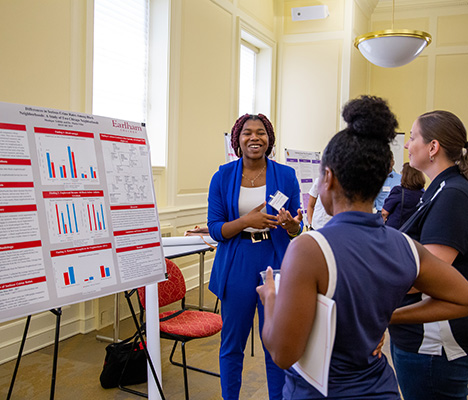Summer Research Initiative Founder Expands Program with Gifts
A generous $50,000 gift from Robert "Bob" Steele, former BSOS associate dean, supports students in the Summer Research Initiative (SRI) and expands the scope of the program. Steele helped to found the SRI in 1999. The summer of 2023 marks the program's 25th anniversary.
This landmark gift follows a previous gift of $6,000 gift that Steele made, which supports two of the 12 to 14 scholars selected to participate in the 2022 iteration of the program he helped establish.
Since its inception, the BSOS SRI program has successfully encouraged students from underrepresented minority groups to engage in social and behavioral science research, and pursue graduate degrees in related fields. The SRI has become a strong pipeline to encourage talented undergraduates on the path to graduate school, and toward distinguished careers in fields including academia.
The now college-wide program—hosting underrepresented juniors and seniors in a house on the University of Maryland's Fraternity Row for an intensive, 8-week living-learning research apprenticeship—was borne out of Steele's observation that the undergraduates in his department, the Department of Psychology, were struggling to get into Ph.D. programs.
“These students had the grades and recommendations, but they were lacking in hands-on experience,” recalled Steele.
After witnessing success in Psychology, the BSOS dean at that time, Irwin “Irv” Goldstein, asked Steele to expand the program to the rest of the college—something Steele knew would require buy-in from multiple entities if the program were to last. Steele managed to get an initial shared commitment to the program split between the Office of the Dean, the Office of the Provost, and the participating BSOS departments. Today, the Graduate School and the Office of the Vice President for Research also help support the SRI, and the program has been emulated by others across campus as well.
“Bob built it to last,” said Assistant Dean for Diversity, Equity and Inclusion Kim Nickerson, who has directed the SRI since 2006. “He didn’t just whimsically say ‘Let’s try this this year, and maybe we will try something else next year.’ He really was thoughtful in trying to build the program so that it could be sustainable, and sustained.”
Beginning in 2007, a six-year Alliance for Graduate Education and the Professoriate (AGEP) grant from the National Science Foundation helped BSOS bolster the program, allowing the duration of the program to lengthen from six weeks to eight, and, as a result, help make the program so sought-after. Today, the program’s annual applicant pool ranges from 300 to 600 undergraduate students from institutions nationwide, including Puerto Rico and the Virgin Islands.

“I always tip my hat to Bob because he did something that needed to be done,” Nickerson said. “He said, ‘We have a great college with great researchers throughout. We ought to bring minorities to our campus to do research in the summer, and maybe we can recruit them into our graduate programs.’ And that’s exactly what the SRI has done.”
Indeed, the BSOS SRI program was a transformative experience for William Bishop, a participant of the 2016 BSOS SRI who is now working toward his Ph.D. in American Politics within the college. It’s also the program through which Bishop meet Department of Government and Politics professor Mike Hanmer, who helped him participate this past fall in a news polling fellowship with The Washington Post.
“I had a great experience working with my mentor, Dr. Antoine Banks, for that summer, and that’s really the reason I came back to the University of Maryland,” said Bishop. “I felt that the Department of Government and Politics was somewhere where faculty was doing research that I was interested in, and I felt supported there. It was pretty easy for me to decide to come back.”
Helping students make decisions about their future that, in turn, also help to solve some of the world’s greatest challenges is exactly why Steele continues to give to the BSOS SRI program.
“One of my operating principles is that if you want to talk about expanding research into issues around social justice and issues that impact the psychosocial needs of minorities, you have to have people who mirror those experiences,” he said. “My hope is that these students will see this as a career path for them, and that the program will continue to provide them with the support they need to make that possible.”
Published on Thu, Jan 20, 2022 - 10:34AM



